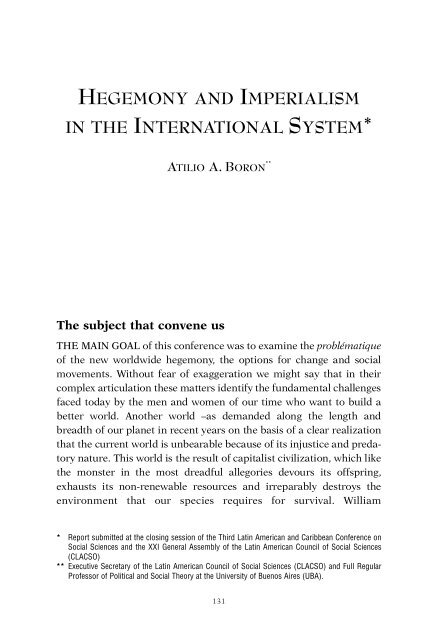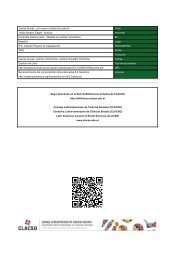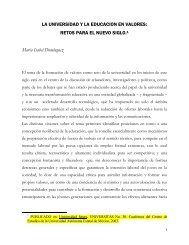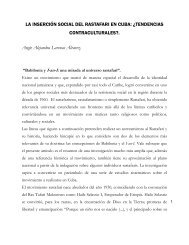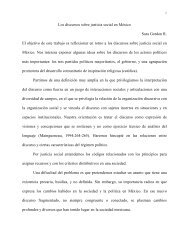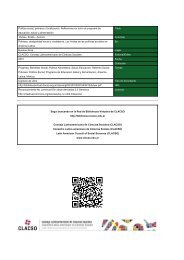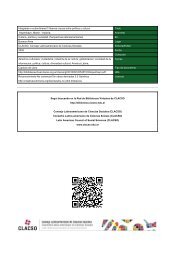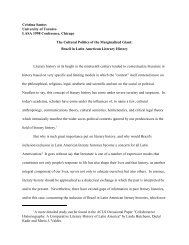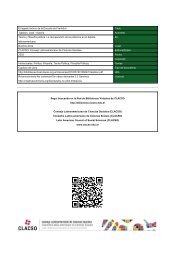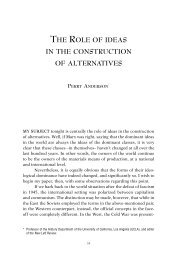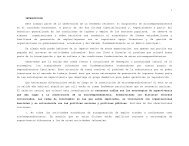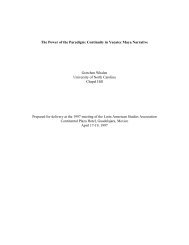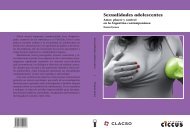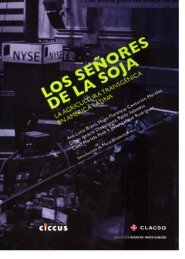hegemony and imperialism in the international system - Clacso
hegemony and imperialism in the international system - Clacso
hegemony and imperialism in the international system - Clacso
You also want an ePaper? Increase the reach of your titles
YUMPU automatically turns print PDFs into web optimized ePapers that Google loves.
HEGEMONY AND IMPERIALISM<br />
IN THE INTERNATIONAL SYSTEM*<br />
ATILIO A. BORON **<br />
The subject that convene us<br />
THE MAIN GOAL of this conference was to exam<strong>in</strong>e <strong>the</strong> p r o b l é m a t i q u e<br />
of <strong>the</strong> new worldwide <strong>hegemony</strong>, <strong>the</strong> options for change <strong>and</strong> social<br />
movements. Without fear of exaggeration we might say that <strong>in</strong> <strong>the</strong>ir<br />
complex articulation <strong>the</strong>se matters identify <strong>the</strong> fundamental challenges<br />
faced today by <strong>the</strong> men <strong>and</strong> women of our time who want to build a<br />
better world. Ano<strong>the</strong>r world –as dem<strong>and</strong>ed along <strong>the</strong> length <strong>and</strong><br />
breadth of our planet <strong>in</strong> recent years on <strong>the</strong> basis of a clear realization<br />
that <strong>the</strong> current world is unbearable because of its <strong>in</strong>justice <strong>and</strong> predatory<br />
nature. This world is <strong>the</strong> result of capitalist civilization, which like<br />
<strong>the</strong> monster <strong>in</strong> <strong>the</strong> most dreadful allegories devours its off s p r i n g ,<br />
exhausts its non-renewable resources <strong>and</strong> irreparably destroys <strong>the</strong><br />
environment that our species requires for survival. Wi l l i a m<br />
* Report submitted at <strong>the</strong> clos<strong>in</strong>g session of <strong>the</strong> Third Lat<strong>in</strong> American <strong>and</strong> Caribbean Conference on<br />
Social Sciences <strong>and</strong> <strong>the</strong> XXI General Assembly of <strong>the</strong> Lat<strong>in</strong> American Council of Social Sciences<br />
(CLACSO)<br />
** Executive Secretary of <strong>the</strong> Lat<strong>in</strong> American Council of Social Sciences (CLACSO) <strong>and</strong> Full Regular<br />
Professor of Political <strong>and</strong> Social Theory at <strong>the</strong> University of Buenos Aires (UBA).<br />
131
NEW WORLDWIDE HEGEMONY. ALTERNATIVES FOR CHANGE ANDSOCIAL MOVEMENTS<br />
S h a k e s p e a r e ’s reflection, when he makes one of his characters say, “Yo u<br />
take my life when you do take <strong>the</strong> means whereby I live,” seems highly<br />
fitt<strong>in</strong>g. The predatory nature of capitalism, exacerbated <strong>in</strong> its current<br />
phase, has led precisely to this po<strong>in</strong>t: depriv<strong>in</strong>g three quarters of<br />
humanity of <strong>the</strong>ir livelihood <strong>and</strong> destroy<strong>in</strong>g <strong>the</strong> environment that made<br />
it possible for human life to appear <strong>and</strong> ma<strong>in</strong>ta<strong>in</strong> itself on this planet.<br />
A civilization which <strong>in</strong> <strong>the</strong> name of eff i c i e n c y, rationality <strong>and</strong> progress<br />
slowly <strong>and</strong> silently carries out <strong>the</strong> biggest genocide known <strong>in</strong> <strong>the</strong> history<br />
of humanity. Every year near forty million people, most of <strong>the</strong>m children,<br />
die of hunger <strong>and</strong> curable diseases. In o<strong>the</strong>r words, <strong>in</strong> just one<br />
year capitalism annihilates more than half <strong>the</strong> number of victims<br />
caused by <strong>the</strong> Second World War over six years. The large social<br />
movements that today challenge this situation do so on <strong>the</strong> basis of <strong>the</strong><br />
conviction that o<strong>the</strong>r world is not only possible but also necessary <strong>and</strong><br />
urgent. I shall attempt, <strong>in</strong> <strong>the</strong> follow<strong>in</strong>g pages, to set forth a brief summary<br />
of <strong>the</strong> debates held with<strong>in</strong> <strong>the</strong> framework of this event. The<br />
emphasis will be placed both on <strong>the</strong> ma<strong>in</strong> areas of agreement <strong>and</strong> on<br />
<strong>the</strong> issues under dispute.<br />
A new phase?<br />
There is an extremely wide consensus <strong>in</strong> <strong>the</strong> sense that <strong>the</strong> world<br />
imperialist <strong>system</strong> has entered a new phase <strong>in</strong> its evolution. This transition<br />
didn’t escape <strong>the</strong> notice of its spokespeople <strong>and</strong> ideological representatives,<br />
who hurried to endow this new stage with a name that<br />
underl<strong>in</strong>ed <strong>the</strong> dazzl<strong>in</strong>g features of its appearance while carefully hid<strong>in</strong>g<br />
its deepest essence: globalization. The more strik<strong>in</strong>g aspects of this<br />
process seem to substantiate <strong>the</strong> idea of an <strong>in</strong>creas<strong>in</strong>g globalization of<br />
productive processes <strong>and</strong> of <strong>the</strong> operation of <strong>the</strong> diverse markets.<br />
Never<strong>the</strong>less, <strong>the</strong> scope of this phenomenon has been extraord<strong>in</strong>arily<br />
exaggerated <strong>and</strong> nowadays <strong>the</strong> available research already demonstrates<br />
that <strong>the</strong> much trumpeted globalization –which <strong>the</strong> French correctly<br />
call mondialization, someth<strong>in</strong>g like “worldization,” to allude to<br />
<strong>the</strong> will-related, not at all natural, elements that boost it– is a phenomenon<br />
that acquires a different solidity depend<strong>in</strong>g on what is be<strong>in</strong>g<br />
talked about. The <strong>in</strong>ternational f<strong>in</strong>ancial <strong>system</strong> has, no doubt, been<br />
1 We have exam<strong>in</strong>ed this subject <strong>in</strong> Tiempos violentos. Neoliberalismo, globalización y desigualdad en<br />
América Lat<strong>in</strong>a, 2004 (1999), which <strong>in</strong>cludes a detailed bibliography on <strong>the</strong> issue.<br />
132
ATILIO A. BORON<br />
globalized; but <strong>the</strong> same has not happened with trade <strong>in</strong> agricultural<br />
products <strong>and</strong> with a broad swath of <strong>the</strong> service sector 1 .<br />
The champions of neoliberalism were not tardy <strong>in</strong> announc<strong>in</strong>g<br />
that <strong>the</strong> advent of globalization brought to an end “<strong>the</strong> age of <strong>imperialism</strong>”.<br />
This was now duly acknowledged while before its sole existence<br />
had been stubbornly denied, attributed to <strong>the</strong> feverish imag<strong>in</strong>ation<br />
of critics on <strong>the</strong> left, always ready to give vent to <strong>the</strong>ir visceral<br />
hate aga<strong>in</strong>st <strong>the</strong> <strong>system</strong> with all types of charges <strong>and</strong> challenges.<br />
Accord<strong>in</strong>g to <strong>the</strong> right, <strong>the</strong> imperialist experience, already ended,<br />
was expla<strong>in</strong>ed by a series of factors allegedly foreign to capitalism.<br />
St<strong>and</strong><strong>in</strong>g out among <strong>the</strong>m were militarism, nationalism <strong>and</strong> protectionism.<br />
Exhibit<strong>in</strong>g a colossal disregard for <strong>the</strong> lessons of history<br />
<strong>the</strong>y isolated <strong>the</strong>se factors from <strong>the</strong> reality of capitalist development,<br />
as if it hadn’t been precisely <strong>the</strong> latter which engendered <strong>the</strong>m, <strong>and</strong><br />
re-edited <strong>the</strong> dusty <strong>the</strong>sis of “sweet commerce” proposed, as Albert<br />
Hirschman rightly observed, by <strong>the</strong> first ideologists of bourgeois<br />
society over <strong>the</strong> course of eighteenth century. A <strong>the</strong>sis which, <strong>in</strong><br />
essence, held that <strong>the</strong> development of trade calms spirits <strong>and</strong> curbs<br />
p e o p l e ’s “bellicose <strong>in</strong>st<strong>in</strong>cts.” If <strong>the</strong>y trade, <strong>the</strong>y said, <strong>the</strong>re will be no<br />
wars. And despite <strong>the</strong> thorough refutation provided by history (<strong>and</strong><br />
by <strong>the</strong> present) this <strong>the</strong>sis reappears <strong>in</strong> our time <strong>in</strong> <strong>the</strong> writ<strong>in</strong>gs of<br />
globalization <strong>the</strong>orists.<br />
The accelerated <strong>and</strong> profound changes experienced as of <strong>the</strong><br />
clos<strong>in</strong>g decades of <strong>the</strong> last century left popular movements, <strong>and</strong> <strong>the</strong><br />
left itself, deeply disconcerted. If <strong>the</strong> organic <strong>in</strong>tellectuals of <strong>the</strong> right<br />
hastened to salute <strong>the</strong> novelties as a radical break with <strong>the</strong> opprobrious<br />
imperialist past, <strong>in</strong> <strong>the</strong> leftist camp confusion reached unthoughtof<br />
levels when some of its most respected <strong>the</strong>orists stated, <strong>in</strong> agreement<br />
with <strong>the</strong>ir alleged adversaries, that global neoliberalism<br />
expressed <strong>the</strong> historical overcom<strong>in</strong>g of <strong>imperialism</strong>, <strong>and</strong> that we were<br />
<strong>in</strong> front of a new reality of <strong>in</strong>ternational politics <strong>and</strong> economics that<br />
could be given <strong>the</strong> name of “empire.” An empire, naturally, without<br />
imperialist relations of dom<strong>in</strong>ation. An empire without <strong>imperialism</strong>,<br />
acknowledged <strong>in</strong> a play on words whose most important effect was to<br />
produce <strong>the</strong> ideological disarmament of contest<strong>in</strong>g social forces. S<strong>in</strong>ce<br />
we have exam<strong>in</strong>ed those <strong>the</strong>ses –ma<strong>in</strong>ta<strong>in</strong>ed fundamentally but not<br />
2 Hardt’s <strong>and</strong> Negri’s <strong>the</strong>ses have been subjected to extremely tough criticism from <strong>the</strong> moment <strong>the</strong>y<br />
were rendered <strong>in</strong> Empire (2000). Daniel Bensaid, Alex Call<strong>in</strong>icos, Néstor Kohan, Ellen Meiks<strong>in</strong>s Wood,<br />
Leo Panitch <strong>and</strong> <strong>the</strong> author of this article have discussed this work <strong>in</strong> detail from diverse perspectives.<br />
133
NEW WORLDWIDE HEGEMONY. ALTERNATIVES FOR CHANGE ANDSOCIAL MOVEMENTS<br />
exclusively by Michael Hardt <strong>and</strong> Antonio Negri– <strong>in</strong> extenso elsewhere,<br />
we shall not attempt to refute <strong>the</strong>m once aga<strong>in</strong> <strong>in</strong> this paper 2 .<br />
Never<strong>the</strong>less, what is be<strong>in</strong>g ratified for a long time now <strong>and</strong> has<br />
emerged quite clearly from <strong>the</strong> discussions of this Conference is that<br />
globalization could be better characterized not as <strong>the</strong> overcom<strong>in</strong>g of<br />
<strong>imperialism</strong> but as a new phase with<strong>in</strong> <strong>the</strong> imperialist stage of capitalism.<br />
Maybe we should ask ourselves whe<strong>the</strong>r it isn’t a new “higher<br />
phase,” to employ Len<strong>in</strong>’s celebrated expression, which poses serious<br />
problems of <strong>in</strong>terpretation when it comes to identify<strong>in</strong>g its fundamental<br />
features. In <strong>the</strong> discourse of neoliberalism, globalization is none<br />
o<strong>the</strong>r than <strong>the</strong> ratification of <strong>the</strong> <strong>in</strong>exorable “naturalness” of capitalism,<br />
exalted as a k<strong>in</strong>d of “natural order of <strong>the</strong> universe,” <strong>and</strong> <strong>the</strong> f<strong>in</strong>al<br />
stage of <strong>the</strong> historical movement f<strong>in</strong>ally imposed on <strong>the</strong> entire surface<br />
of <strong>the</strong> terrestrial globe <strong>and</strong> which expresses <strong>the</strong> selfish <strong>and</strong> acquisitive<br />
nature of <strong>the</strong> human species. As Franz H<strong>in</strong>kelammert has po<strong>in</strong>ted out<br />
<strong>in</strong> several of his writ<strong>in</strong>gs, <strong>the</strong> corollary of this reason<strong>in</strong>g is <strong>the</strong> dehumanization<br />
of those who oppose <strong>the</strong> world dom<strong>in</strong>ance of capital. And<br />
<strong>in</strong> <strong>the</strong> same way that <strong>the</strong> native peoples of <strong>the</strong> Americas were massacred<br />
without remorse because, after all, <strong>the</strong>ir very condition as human<br />
be<strong>in</strong>gs had been denied to <strong>the</strong>m because only beasts could be opposed<br />
to <strong>the</strong> advance of “civilization,” <strong>the</strong> current victims <strong>and</strong> <strong>the</strong> opponents<br />
of capitalism will suffer <strong>the</strong> same fate. They too constitute a surplus<br />
population, unexploitable <strong>and</strong> superfluous, which does not deserve any<br />
respect <strong>and</strong> for whom human rights constitute a merciful fabrication.<br />
Genocide cont<strong>in</strong>ues its march undaunted (H<strong>in</strong>kelammert, 2002).<br />
Th<strong>in</strong>gs be<strong>in</strong>g this way, for <strong>the</strong> ideologists of neoliberalism globalization<br />
has unequivocal epistemological <strong>and</strong> political implications.<br />
With regard to <strong>the</strong> former, <strong>the</strong> primacy of <strong>the</strong> pensamiento único ( “ t h e<br />
s<strong>in</strong>gle dom<strong>in</strong>ant thought”), constructed on <strong>the</strong> premises of neoclassical<br />
economics, <strong>the</strong> only one capable of decipher<strong>in</strong>g <strong>the</strong> mean<strong>in</strong>g <strong>and</strong><br />
def<strong>in</strong><strong>in</strong>g features of <strong>the</strong> new society. With regard to <strong>the</strong> latter, <strong>the</strong><br />
enshr<strong>in</strong><strong>in</strong>g of <strong>the</strong> Wash<strong>in</strong>gton Consensus paradigm as <strong>the</strong> only possible<br />
economic policy, to which all o<strong>the</strong>rs must be subord<strong>in</strong>ated. As<br />
Margaret Thatcher put it, “<strong>the</strong>re is no alternative.” It is for this reason<br />
that social or political p r o b l é m a t i q u e s are posed as merely technical<br />
matters, <strong>in</strong>dependent of any ideological position. It is unnecessary<br />
to stop to refute this worldview constructed by <strong>the</strong> ideological<br />
apparatuses of capital. Let us say, simply, that this entire argumentation<br />
does not resist <strong>the</strong> evidence provided by history <strong>and</strong> by <strong>the</strong> contemporary<br />
situation.<br />
134
ATILIO A. BORON<br />
The <strong>in</strong>terpretation that emerges from <strong>the</strong> discussions held <strong>in</strong> this<br />
Conference shows that, far from dilut<strong>in</strong>g <strong>imperialism</strong> <strong>in</strong> a k<strong>in</strong>d of<br />
benevolent empire, an empire that is <strong>in</strong>nocuous <strong>and</strong> harmless, globalization<br />
has, on <strong>the</strong> contrary, produced a radical accentuation of <strong>the</strong><br />
traditional features of <strong>imperialism</strong>, extraord<strong>in</strong>arily streng<strong>the</strong>n<strong>in</strong>g its<br />
genocidal <strong>and</strong> predatory nature.<br />
The limits of classical <strong>the</strong>orization of <strong>imperialism</strong><br />
The foundations of <strong>the</strong> above-mentioned confusion are symptomatic<br />
of <strong>the</strong> shortcom<strong>in</strong>gs of <strong>the</strong> traditional <strong>the</strong>orization of <strong>imperialism</strong> <strong>in</strong><br />
front of <strong>the</strong> transformations experienced by <strong>the</strong> capitalist mode of<br />
production over <strong>the</strong> course of <strong>the</strong> twentieth century. As was recalled<br />
at <strong>the</strong> time by <strong>the</strong> Indian Marxist Prabhat Patnaik <strong>in</strong> his brief essay<br />
which appeared <strong>in</strong> <strong>the</strong> Monthly Review at <strong>the</strong> beg<strong>in</strong>n<strong>in</strong>g of <strong>the</strong> 1990s,<br />
<strong>the</strong> term “imperialist” had virtually disappeared from <strong>the</strong> media, literature<br />
<strong>and</strong> discourses of socialists <strong>and</strong> communists alike. (Patnaik,<br />
1990) The same happened with <strong>the</strong> word “dependence,” paradoxically<br />
<strong>in</strong> a period <strong>in</strong> which dependence reached humiliat<strong>in</strong>g extremes<br />
<strong>in</strong> our countries. Whoever pronounced those words was quickly catalogued<br />
as an <strong>in</strong>curable nostalgic or a fanatic that stubbornly close<br />
his eyes to <strong>the</strong> evident transformations that had occurred <strong>in</strong> recent<br />
years. No “well-th<strong>in</strong>k<strong>in</strong>g” <strong>in</strong>tellectual, politician or leader could<br />
<strong>in</strong>cur <strong>in</strong> such an aberration with<strong>in</strong> neoliberal capitalism without<br />
turn<strong>in</strong>g <strong>in</strong>to <strong>the</strong> laugh<strong>in</strong>g-stock of <strong>the</strong> global village 3 . In any case, <strong>and</strong><br />
sett<strong>in</strong>g this issue aside, <strong>the</strong> truth is that <strong>the</strong> vanish<strong>in</strong>g of <strong>the</strong> p r o b l ém<br />
a t i q u e of <strong>imperialism</strong> <strong>and</strong> its disappearance from horizon of visibility<br />
of peoples was a symptom of two th<strong>in</strong>gs. On one h<strong>and</strong>, of <strong>the</strong><br />
irresistible ascent of neoliberalism as <strong>the</strong> ideology of capitalist globalization<br />
<strong>in</strong> <strong>the</strong> last two decades of <strong>the</strong> last century; on <strong>the</strong> o<strong>the</strong>r, a<br />
symptom of <strong>the</strong> notable transformations that occurred from <strong>the</strong> end<br />
of <strong>the</strong> Second World War on, which questioned some of <strong>the</strong> very<br />
premises of <strong>the</strong> classical <strong>the</strong>ories of <strong>imperialism</strong> formulated <strong>in</strong> <strong>the</strong><br />
first two decades of <strong>the</strong> century by Hobson, Hilferd<strong>in</strong>g, Len<strong>in</strong>,<br />
Bukhar<strong>in</strong> <strong>and</strong> Rosa Luxemburg, to mention only <strong>the</strong> ma<strong>in</strong> figures.<br />
Let us look at this latter <strong>in</strong> greater detail.<br />
3 Regard<strong>in</strong>g <strong>the</strong> ravages wrought by “well th<strong>in</strong>k<strong>in</strong>g” <strong>in</strong> our time, <strong>and</strong> especially among left-w<strong>in</strong>g movements,<br />
consult <strong>the</strong> magnificent essay by <strong>the</strong> Spanish writer <strong>and</strong> playwright Alfonso Sastre (2003).<br />
135
NEW WORLDWIDE HEGEMONY. ALTERNATIVES FOR CHANGE AND SOCIAL MOVEMENTS<br />
(a) To beg<strong>in</strong> with, let us say that a decisive aspect of <strong>the</strong>se <strong>the</strong>ories<br />
was <strong>the</strong> tight association exist<strong>in</strong>g between <strong>imperialism</strong> <strong>and</strong> crisis of<br />
capitalism <strong>in</strong> <strong>the</strong> metropolitan economies. The former was seen,<br />
e s s e n t i a l l y, as <strong>the</strong> mechanism by which mature capitalism transitorily<br />
resolved <strong>the</strong> crises generated by <strong>the</strong> <strong>in</strong>crease <strong>in</strong> <strong>the</strong> organic composition<br />
of capital <strong>and</strong> <strong>the</strong> decreas<strong>in</strong>g trend of <strong>the</strong> profit rate. The<br />
period that began after <strong>the</strong> end of <strong>the</strong> Second World War plunged this<br />
relation flagrantly <strong>in</strong>to crisis. Indeed, <strong>the</strong> “golden age” that unfolded<br />
between 1948 <strong>and</strong> <strong>the</strong> mid-1970s was <strong>the</strong> most successful boom period<br />
<strong>in</strong> <strong>the</strong> history of capitalism. At no o<strong>the</strong>r time had a cycle of prosperity<br />
persisted over <strong>the</strong> course of almost three decades, with rates of<br />
economic growth that were so high <strong>and</strong> that reached almost all capitalist<br />
economies. But, contradict<strong>in</strong>g <strong>the</strong> postulates of classical <strong>the</strong>orization,<br />
that period was at <strong>the</strong> same time one of <strong>the</strong> most aggressive<br />
ones from <strong>the</strong> st<strong>and</strong>po<strong>in</strong>t of imperialist, especially U.S., expansion,<br />
over <strong>the</strong> entire face of <strong>the</strong> earth. The classical connection between<br />
capitalist crisis <strong>and</strong> imperialist expansion was thus broken, trigger<strong>in</strong>g<br />
<strong>the</strong> perplexity of those who still clung to <strong>the</strong> classical formulations of<br />
<strong>imperialism</strong>. Capitalism was boom<strong>in</strong>g <strong>and</strong> <strong>imperialism</strong> was extend<strong>in</strong>g<br />
ever more strongly. The <strong>the</strong>ory required an urgent revision<br />
(Panitch & G<strong>in</strong>d<strong>in</strong>, 2003: 30-31).<br />
(b) Ano<strong>the</strong>r verification that came to worsen <strong>the</strong> <strong>the</strong>oretical confusion<br />
<strong>in</strong> <strong>the</strong> ranks of <strong>the</strong> left was <strong>the</strong> follow<strong>in</strong>g: <strong>in</strong> classical formulations <strong>the</strong><br />
race for <strong>the</strong> appropriation of colonies <strong>and</strong> <strong>the</strong> carv<strong>in</strong>g up of <strong>the</strong> world<br />
had an <strong>in</strong>escapable colophon <strong>in</strong> <strong>in</strong>ter-imperialist war. Economic rivalry<br />
sooner or later translated <strong>in</strong>to military rivalry <strong>and</strong> armed conflict.<br />
There was <strong>the</strong> precedent supplied by <strong>the</strong> two great world wars that<br />
shook <strong>the</strong> first half of <strong>the</strong> twentieth century to provide an irrefutable<br />
proof of <strong>the</strong> truth of that assertion. The novelty contributed by <strong>the</strong><br />
capitalist reconstruction of <strong>the</strong> second post-war period was that <strong>the</strong><br />
exacerbated economic competition among <strong>the</strong> metropolitan countries<br />
has never been translated <strong>in</strong> <strong>the</strong> last fifty years <strong>in</strong>to an armed<br />
encounter among <strong>the</strong>m. To Kautsky goes <strong>the</strong> merit of hav<strong>in</strong>g been <strong>the</strong><br />
first <strong>in</strong> glimps<strong>in</strong>g <strong>the</strong>se new realities, which does not preclude <strong>the</strong> fact<br />
that his <strong>the</strong>sis of “ultra-<strong>imperialism</strong>” suffers from serious defects. One<br />
of <strong>the</strong>m, perhaps <strong>the</strong> ma<strong>in</strong> one, is his hav<strong>in</strong>g concluded that <strong>the</strong> coalition<br />
among <strong>the</strong> imperialist monopolies of <strong>the</strong> great powers would<br />
<strong>in</strong>augurate an era of peace. If <strong>the</strong> ideological mentor of <strong>the</strong> Second<br />
International was able to accurately discern this trend toward <strong>in</strong>ter-<br />
136
ATILIO A. BORON<br />
imperialist convergence, his strong Eurocentrism prevented him from<br />
foresee<strong>in</strong>g that <strong>the</strong> latter would not br<strong>in</strong>g about a Kantian “perpetual<br />
peace.” War was to cont<strong>in</strong>ue, except that it would now take place <strong>in</strong><br />
Third World sett<strong>in</strong>gs <strong>and</strong> would take place aga<strong>in</strong>st <strong>the</strong>ir peoples. In<br />
any case, <strong>and</strong> to summarize, this new situation posed a serious challenge<br />
to <strong>the</strong> conventional wisdom of classical <strong>the</strong>ories of <strong>imperialism</strong>,<br />
steep<strong>in</strong>g <strong>the</strong> left <strong>in</strong>to a paralyz<strong>in</strong>g perplexity.<br />
(c) Lastly, ano<strong>the</strong>r issue that threw classical <strong>the</strong>orizations about <strong>imperialism</strong><br />
<strong>in</strong>to crisis was, <strong>in</strong> <strong>the</strong> current phase of accelerated mondializa -<br />
tion of capitalist accumulation, <strong>the</strong> unprecedented expansion of capitalism<br />
across <strong>the</strong> length <strong>and</strong> breadth of <strong>the</strong> planet. While, as Marx <strong>and</strong><br />
Engels noted <strong>in</strong> <strong>the</strong> Communist Manifesto, capitalism has always been<br />
a social regime of production characterized by expansionary tendencies,<br />
both <strong>in</strong> physical <strong>and</strong> <strong>in</strong> social geography, <strong>the</strong> classical <strong>the</strong>orizations<br />
of <strong>imperialism</strong> rested on an assumption that <strong>in</strong> our times is<br />
unsusta<strong>in</strong>able: <strong>the</strong> existence of vast peripheral regions (or “agrarian”<br />
regions, as was <strong>the</strong> customary expression at that time) <strong>in</strong> which capitalism<br />
was virtually unknown. As Ellen Meiks<strong>in</strong>s Wood accurately<br />
po<strong>in</strong>ts out, classical <strong>the</strong>ories of <strong>imperialism</strong> “assume, by def<strong>in</strong>ition,<br />
<strong>the</strong> existence of a ‘non capitalist environment’ as a condition for its<br />
very existence”. (2003: 127) In o<strong>the</strong>r words, metropolitan capitalism<br />
required <strong>the</strong> presence of an agrarian, primitive, peripheral pre-capitalist<br />
world to provide it with <strong>the</strong> necessary oxygen to survive <strong>the</strong><br />
harsh conditions imposed by <strong>the</strong> crisis <strong>in</strong> <strong>the</strong> metropolises. Hence <strong>the</strong><br />
violent struggle to carve up <strong>the</strong> world <strong>and</strong> <strong>the</strong> <strong>in</strong>term<strong>in</strong>able colonial<br />
annexation wars. Never<strong>the</strong>less, our time is <strong>the</strong> witness of an accelerated<br />
mondialization of capitalism, especially after <strong>the</strong> fall of <strong>the</strong> Berl<strong>in</strong><br />
Wall, <strong>the</strong> implosion of <strong>the</strong> former Soviet Union <strong>and</strong>, almost simultaneously,<br />
<strong>the</strong> open<strong>in</strong>g of Ch<strong>in</strong>a to market forces, all of which presupposes<br />
<strong>the</strong> constitution of a worldwide space –we might say a global<br />
one– <strong>in</strong> which <strong>the</strong> predom<strong>in</strong>ance of capitalism is unarguable. Despite<br />
<strong>the</strong> virtual subsum<strong>in</strong>g of <strong>the</strong> former “agrarian regions” to <strong>the</strong> logic of<br />
capital, <strong>imperialism</strong> cont<strong>in</strong>ues its march <strong>and</strong>, albeit with many problems,<br />
survives its own crises. As Perry Anderson accurately po<strong>in</strong>ted<br />
out, when it appeared that <strong>in</strong> <strong>the</strong> 1970s <strong>and</strong> early 1980s it was fac<strong>in</strong>g<br />
its most serious crisis s<strong>in</strong>ce <strong>the</strong> times of <strong>the</strong> Great Depression, <strong>the</strong> collapse<br />
of <strong>the</strong> Soviet Union <strong>and</strong> <strong>the</strong> open<strong>in</strong>g of Ch<strong>in</strong>a blew fresh air on<br />
capitalist reproduction (Anderson, 2003).<br />
137
NEW WORLDWIDE HEGEMONY. ALTERNATIVES FOR CHANGE ANDSOCIAL MOVEMENTS<br />
Responses to <strong>the</strong> new challenges<br />
Now <strong>the</strong>n, <strong>the</strong> transcendence of <strong>the</strong>se changes –which are certa<strong>in</strong>ly<br />
not <strong>the</strong> only ones, although <strong>the</strong>y are <strong>the</strong> most important ones– has<br />
given rise to three different attitudes. On one h<strong>and</strong>, <strong>the</strong>re are those on<br />
<strong>the</strong> dogmatic left who refuse to recognize <strong>the</strong> reality <strong>and</strong> importance<br />
of <strong>the</strong>se changes, argu<strong>in</strong>g that <strong>the</strong>y are only superficial transformations<br />
lack<strong>in</strong>g <strong>in</strong> significance. Noth<strong>in</strong>g important has changed <strong>and</strong><br />
<strong>the</strong>refore noth<strong>in</strong>g needs to be changed or revised <strong>in</strong> classical <strong>the</strong>ory.<br />
“Essentialism” h<strong>in</strong>ders <strong>the</strong> construction of policies because it is<br />
unable to establish differences: Sc<strong>and</strong><strong>in</strong>avian capitalism is <strong>the</strong> same<br />
th<strong>in</strong>g as <strong>the</strong> capitalist governments of Lat<strong>in</strong> America. As capitalism<br />
cont<strong>in</strong>ues to be capitalist, <strong>imperialism</strong> is <strong>the</strong> same. Its changes are<br />
merely superficial. The <strong>the</strong>ory rema<strong>in</strong>s unsca<strong>the</strong>d <strong>and</strong> <strong>the</strong>re is noth<strong>in</strong>g<br />
to modify, because noth<strong>in</strong>g has changed.<br />
There are, next, those who on <strong>the</strong> basis of <strong>the</strong> recognition of<br />
such changes turn to back<strong>in</strong>g <strong>the</strong>ses located on <strong>the</strong> antipodes of those<br />
<strong>the</strong>y had traditionally favored. In some cases, as <strong>in</strong> <strong>the</strong> work of<br />
Ernesto Laclau <strong>and</strong> Chantal Mouffe, to recognize –implicitly <strong>and</strong> with<br />
embarrassment– <strong>the</strong> f<strong>in</strong>al victory of capitalism <strong>and</strong> to seek consolation<br />
<strong>in</strong> a proposal of “democratic radicalization” which, both <strong>in</strong> fact <strong>and</strong> <strong>in</strong><br />
<strong>the</strong>ory, limits itself to soften<strong>in</strong>g <strong>the</strong> most irritat<strong>in</strong>g aspects of bourgeois<br />
dom<strong>in</strong>ance without propos<strong>in</strong>g its abolition. As regards <strong>the</strong> subject<br />
that we are deal<strong>in</strong>g with, those who adopt this defeatist attitude<br />
announce “<strong>the</strong> end of <strong>the</strong> imperialist era” <strong>and</strong> <strong>the</strong> advent of a new<br />
form of <strong>in</strong>ternational organization, “<strong>the</strong> empire,” which is supposed to<br />
have freed itself from its predecessor’s defects. The locus classicus of<br />
this position is, of course, Michael Hardt <strong>and</strong> Antonio Negri’s book,<br />
Empire (2000), to which we have referred above (Boron, 2002).<br />
There are, lastly, those of us who, recogniz<strong>in</strong>g <strong>the</strong> enormous<br />
importance of <strong>the</strong> changes alluded to, <strong>in</strong>sist that <strong>imperialism</strong> hasn’t<br />
transformed itself <strong>in</strong>to its opposite, nor has it been diluted <strong>in</strong>to a<br />
vaporous “<strong>in</strong>ternational <strong>system</strong>” or <strong>in</strong>to <strong>the</strong> vagueness of a new “global<br />
<strong>system</strong> of dom<strong>in</strong>ation.” It has been transformed, but cont<strong>in</strong>ues to<br />
be imperialist. In <strong>the</strong> same way that years do not convert <strong>the</strong> young<br />
Adam Smith <strong>in</strong>to <strong>the</strong> old Karl Marx, nor does <strong>the</strong> identity of an <strong>in</strong>dividual<br />
vanish by <strong>the</strong> mere pass<strong>in</strong>g of time, <strong>the</strong> mutations experienced<br />
by <strong>imperialism</strong> haven’t even remotely led to <strong>the</strong> construction of a<br />
4 In this section we base ourselves extensively on our Empire & Imperialism (Forthcom<strong>in</strong>g).<br />
138
ATILIO A. BORON<br />
non-imperialist <strong>in</strong>ternational economy 4 . It is undeniable that a fundamental<br />
cont<strong>in</strong>uity exists between <strong>the</strong> supposedly “new” global logic<br />
of <strong>the</strong> empire –its fundamental actors, its <strong>in</strong>stitutions, norms, rules<br />
<strong>and</strong> procedures– <strong>and</strong> that which existed <strong>in</strong> <strong>the</strong> presumably ext<strong>in</strong>ct<br />
phase of <strong>imperialism</strong>. Beyond certa<strong>in</strong> modifications <strong>in</strong> its morpholog<br />
y, <strong>the</strong> strategic actors of both periods are <strong>the</strong> same: <strong>the</strong> large<br />
monopolies of transnational reach <strong>and</strong> with a national base <strong>and</strong> <strong>the</strong><br />
governments of <strong>the</strong> metropolitan countries; <strong>the</strong> <strong>in</strong>stitutions that marshal<br />
<strong>in</strong>ternational economic <strong>and</strong> political flows cont<strong>in</strong>ue to be those<br />
that put <strong>the</strong>ir om<strong>in</strong>ous seal on <strong>the</strong> imperialist phase that some<br />
already consider concluded, like <strong>the</strong> International Monetary Fund<br />
(IMF), <strong>the</strong> World Bank (WB), <strong>the</strong> World Trade Organization (WTO)<br />
<strong>and</strong> o<strong>the</strong>rs of <strong>the</strong>ir ilk; <strong>and</strong> <strong>the</strong> rules of <strong>the</strong> game of <strong>the</strong> <strong>in</strong>ternational<br />
<strong>system</strong> are those that are dictated pr<strong>in</strong>cipally by <strong>the</strong> United States<br />
<strong>and</strong> global neoliberalism, imposed by coercion at <strong>the</strong> height of <strong>the</strong><br />
neoconservative counter-revolution <strong>in</strong> <strong>the</strong> 1980s <strong>and</strong> early 1990s<br />
through a comb<strong>in</strong>ation of pressures, loan’s “conditionalities” <strong>and</strong><br />
manipulations of every k<strong>in</strong>d. Through <strong>the</strong>ir design, purpose <strong>and</strong> functions<br />
<strong>the</strong>se rules of <strong>the</strong> game do noth<strong>in</strong>g but reproduce <strong>and</strong> perpetuate<br />
<strong>the</strong> old imperialist structure <strong>in</strong> which, as it would say <strong>in</strong> T h e<br />
L e o p a r d, “If we want th<strong>in</strong>gs to stay as <strong>the</strong>y are, th<strong>in</strong>gs will have to<br />
change.” Paraphras<strong>in</strong>g Len<strong>in</strong> we might say that <strong>the</strong> empire imag<strong>in</strong>ed<br />
by Hardt <strong>and</strong> Negri, or by <strong>the</strong> <strong>the</strong>oreticians of globalization, is <strong>the</strong><br />
“higher phase” of <strong>imperialism</strong> <strong>and</strong> noth<strong>in</strong>g more. Its operat<strong>in</strong>g logic<br />
is <strong>the</strong> same, <strong>and</strong> so are <strong>the</strong> ideology that justifies its existence, <strong>the</strong><br />
actors that energize it <strong>and</strong> <strong>the</strong> unfair results that reveal <strong>the</strong> dogged<br />
persistence of <strong>the</strong> relations of oppression <strong>and</strong> exploitation.<br />
But as we said earlier, such a dynamic form of production as<br />
capitalism –“which <strong>in</strong>cessantly revolutionizes itself,” as Marx <strong>and</strong><br />
Engels rem<strong>in</strong>d us <strong>in</strong> <strong>the</strong> Communist Manifesto– <strong>and</strong> such a flexible historical<br />
product as that of <strong>imperialism</strong> (its structure, <strong>the</strong> logic of its<br />
operation, its consequences <strong>and</strong> its contradictions) cannot be fully<br />
understood via a Talmudic reread<strong>in</strong>g of <strong>the</strong> classical texts. It is obvious<br />
that today’s <strong>imperialism</strong> isn’t <strong>the</strong> same as before. The “gunboat<br />
diplomacy” of Theodore Roosevelt is today substituted by a much<br />
more lethal weapon: <strong>the</strong> army of economists <strong>and</strong> “experts” of <strong>the</strong> IMF,<br />
<strong>the</strong> WB <strong>and</strong> <strong>the</strong> WTO. Foreign <strong>in</strong>debtedness <strong>and</strong> <strong>the</strong> conditions set by<br />
<strong>the</strong> multilateral banks controlled by <strong>imperialism</strong> are much more efficient<br />
<strong>in</strong>struments of dom<strong>in</strong>ation than those employed <strong>in</strong> <strong>the</strong> past.<br />
Occupation armies are necessary <strong>in</strong> very specific circumstance –as <strong>in</strong><br />
139
NEW WORLDWIDE HEGEMONY. ALTERNATIVES FOR CHANGE AND SOCIAL MOVEMENTS<br />
Iraq, for example– but <strong>the</strong> rout<strong>in</strong>e of imperialist oppression can do<br />
without <strong>the</strong>m on a day-by-day basis. Docile governments, media controlled<br />
by <strong>the</strong> monopolies <strong>and</strong> converted <strong>in</strong>to mere propag<strong>and</strong>a factories,<br />
demobilized <strong>and</strong> demoralized civil societies, <strong>and</strong> corrupt politicians<br />
are much more useful than Mar<strong>in</strong>e platoons or Apache helicopters.<br />
If, <strong>in</strong> <strong>the</strong> past, coups d’etat <strong>and</strong> military dictatorships were<br />
required to impose imperialist policies, <strong>in</strong> today’s Lat<strong>in</strong> America this<br />
job is performed by “democratic” governments aris<strong>in</strong>g from <strong>the</strong> popular<br />
vote <strong>and</strong> that have made a cult of betrayal <strong>and</strong> mendacity. Lastly,<br />
except for very specific situations like Iraq <strong>and</strong> Afghanistan, territorial<br />
occupation has become redundant s<strong>in</strong>ce, by means of trade open<strong>in</strong>g,<br />
privatizations <strong>and</strong> deregulation, <strong>the</strong> economies subjected to <strong>imperialism</strong><br />
are today more dependent than ever without <strong>the</strong> need to fire a<br />
s<strong>in</strong>gle shot or deploy a s<strong>in</strong>gle soldier.<br />
That is why we said that <strong>imperialism</strong> has changed, <strong>and</strong> <strong>in</strong> some<br />
aspects <strong>the</strong> change has been very significant. But it can never be overstressed<br />
that, despite everyth<strong>in</strong>g, it has not been transformed <strong>in</strong>to its<br />
opposite, as is suggested to us by neoliberal mystification, turn<strong>in</strong>g <strong>in</strong>to<br />
a “global” economy <strong>in</strong> which all nations are “<strong>in</strong>terdependent.” It cont<strong>in</strong>ues<br />
to exist <strong>and</strong> to oppress peoples <strong>and</strong> nations, <strong>and</strong> to sow pa<strong>in</strong>,<br />
destruction <strong>and</strong> death <strong>in</strong> its wake. Despite <strong>the</strong> changes it preserves its<br />
identity <strong>and</strong> structure, <strong>and</strong> cont<strong>in</strong>ues to perform its historical role <strong>in</strong><br />
<strong>the</strong> logic of <strong>the</strong> global accumulation of capital. Its mutations, its<br />
volatile <strong>and</strong> dangerous mixture of persistence <strong>and</strong> <strong>in</strong>novation, require<br />
<strong>the</strong> construction of a new approach that will allow us to grasp its current<br />
nature. This isn’t <strong>the</strong> place to proceed to an exam<strong>in</strong>ation of <strong>the</strong><br />
diverse <strong>the</strong>ories on <strong>imperialism</strong>. Let us say, by way of summary, that<br />
beyond <strong>the</strong> transformations <strong>in</strong>dicated above, its fundamental attributes<br />
po<strong>in</strong>ted out by <strong>the</strong> classical authors at <strong>the</strong> time of <strong>the</strong> First World<br />
War cont<strong>in</strong>ue to be current by virtue of <strong>the</strong> fact that <strong>imperialism</strong> is not<br />
an accessory feature or a policy pursued by some states but a new<br />
stage <strong>in</strong> <strong>the</strong> development of capitalism. This stage is marked, today<br />
with greater forcefulness than <strong>in</strong> <strong>the</strong> past, by <strong>the</strong> concentration of capital,<br />
<strong>the</strong> overwhelm<strong>in</strong>g predom<strong>in</strong>ance of <strong>the</strong> monopolies, <strong>the</strong> heightened<br />
role of f<strong>in</strong>ancial capital, <strong>the</strong> export of capital <strong>and</strong> <strong>the</strong> carv<strong>in</strong>g up<br />
of <strong>the</strong> world <strong>in</strong>to different “spheres of <strong>in</strong>fluence.” The acceleration of<br />
<strong>the</strong> process of mondialization that took place <strong>in</strong> <strong>the</strong> last quarter of a<br />
century, far from mitigat<strong>in</strong>g or dissolv<strong>in</strong>g <strong>the</strong> imperialist structures of<br />
<strong>the</strong> world economy, did noth<strong>in</strong>g but extraord<strong>in</strong>arily streng<strong>the</strong>n <strong>the</strong><br />
structural asymmetries that def<strong>in</strong>e <strong>the</strong> <strong>in</strong>sertion of different countries<br />
140
ATILIO A. BORON<br />
<strong>in</strong> it. While a h<strong>and</strong>ful of nations with<strong>in</strong> developed capitalism re<strong>in</strong>forced<br />
<strong>the</strong>ir capacity to, at least <strong>in</strong> part, control productive processes<br />
on a worldwide scale, <strong>the</strong> f<strong>in</strong>ancialization of <strong>the</strong> <strong>in</strong>ternational economy<br />
<strong>and</strong> <strong>the</strong> <strong>in</strong>creas<strong>in</strong>g circulation of goods <strong>and</strong> services, <strong>the</strong> enormous<br />
majority of countries saw <strong>the</strong>ir foreign dependence deepen <strong>and</strong> <strong>the</strong><br />
gap that separates <strong>the</strong>m from <strong>the</strong> metropolises widen to sc<strong>and</strong>alous<br />
levels. Globalization, <strong>in</strong> sum, consolidated imperialist dom<strong>in</strong>ation <strong>and</strong><br />
deepened <strong>the</strong> subjection of peripheral capitalisms, ever more <strong>in</strong>capable<br />
to exercis<strong>in</strong>g a m<strong>in</strong>imal control over <strong>the</strong>ir domestic economic<br />
processes. This cont<strong>in</strong>uity of <strong>the</strong> fundamental parameters of <strong>imperialism</strong><br />
can ill be disguised by a change of name, call<strong>in</strong>g what previously<br />
was <strong>imperialism</strong> “empire.”<br />
Characterization of <strong>the</strong> new phase: lonely superpower<br />
or imperial triad?<br />
Now <strong>the</strong>n, how should this new phase of <strong>imperialism</strong> be characterized?<br />
Let us recall what has been suggested <strong>in</strong> some of <strong>the</strong> papers that<br />
have been presented at this same podium <strong>and</strong> very especially <strong>the</strong> contributions<br />
of Samir Am<strong>in</strong>, Noam Chomsky <strong>and</strong> Perry Anderson collected<br />
<strong>in</strong> this book. In <strong>the</strong> first place, what becomes clear is that a very<br />
pronounced centralization has taken place <strong>in</strong> <strong>the</strong> worldwide structure<br />
of <strong>imperialism</strong>, <strong>the</strong> center of gravity of which has shifted markedly<br />
toward <strong>the</strong> United States. This is a conclusion which, as is known, is<br />
very controversial. From this same rostrum Samir Am<strong>in</strong> posed <strong>the</strong> <strong>the</strong>sis<br />
of a “collective <strong>imperialism</strong>,” <strong>the</strong> idea of an imperial triad. This <strong>the</strong>sis<br />
is not unaware of <strong>the</strong> already mentioned trend but, to our underst<strong>and</strong><strong>in</strong>g,<br />
strongly dim<strong>in</strong>ishes <strong>the</strong> centrality exercised by <strong>the</strong> U.S. <strong>in</strong><br />
susta<strong>in</strong><strong>in</strong>g <strong>and</strong> reproduc<strong>in</strong>g <strong>the</strong> imperialist <strong>system</strong> at a worldwide<br />
level. In any case it is convenient to po<strong>in</strong>t out that this is one of <strong>the</strong><br />
major subjects of debate; a debate which, of course, has not yet been<br />
settled. What seems to us is that on <strong>the</strong> basis of what has been discussed<br />
here <strong>the</strong> imperial triad –<strong>the</strong> United States, Japan <strong>and</strong> <strong>the</strong><br />
European Union– is only apparently such. Stated differently: it is a<br />
triad <strong>in</strong> some aspects but not <strong>in</strong> o<strong>the</strong>rs. Which might be <strong>the</strong> aspects <strong>in</strong><br />
which this triad is diluted <strong>and</strong> gives pride of place to <strong>the</strong> “lonely super-<br />
5 Of Ana Es<strong>the</strong>r Ceceña we recommend her compilation along with Emir Sader (2002).<br />
141
NEW WORLDWIDE HEGEMONY. ALTERNATIVES FOR CHANGE ANDSOCIAL MOVEMENTS<br />
power”? Which are those <strong>in</strong> which imperialist dom<strong>in</strong>ation is constituted<br />
as a collective undertak<strong>in</strong>g?<br />
It seem irrefutably evident that at <strong>the</strong> military level <strong>the</strong> triad does not<br />
exist. At <strong>the</strong> most recent presentation of <strong>the</strong> panel on “War <strong>and</strong> Trade<br />
<strong>in</strong> <strong>the</strong> Empire,” <strong>the</strong> Cuban economist Orl<strong>and</strong>o Martínez <strong>and</strong> <strong>the</strong><br />
Mexican professor at UNAM Ana Es<strong>the</strong>r Ceceña presented overwhelm<strong>in</strong>g<br />
data relat<strong>in</strong>g to <strong>the</strong> extraord<strong>in</strong>ary centralization of military<br />
power <strong>in</strong> <strong>the</strong> h<strong>and</strong>s of <strong>the</strong> United States, unprecedented <strong>in</strong> history 5 .<br />
Thus, talk<strong>in</strong>g about a triad <strong>in</strong> this sphere makes little sense. From <strong>the</strong><br />
military st<strong>and</strong>po<strong>in</strong>t, <strong>the</strong> European Union <strong>and</strong> Japan are merely small<br />
satellites of <strong>the</strong> United States, which are <strong>in</strong> no condition to act<br />
autonomously of <strong>the</strong> directives emanat<strong>in</strong>g from Wash<strong>in</strong>gton. The<br />
European Union has been unable, for decades, to raise <strong>the</strong> flag first<br />
hauled up by Charles de Gaulle <strong>in</strong> pursuit of a common defense policy.<br />
Its economicist meanness is revealed by <strong>the</strong> distance between <strong>the</strong><br />
ardor with which <strong>the</strong> leaders <strong>in</strong> Brussels defend <strong>the</strong>ir common agricultural<br />
policy from <strong>the</strong> <strong>in</strong>decorous pusillanimity with which <strong>the</strong>y<br />
broach issues relative to common European defense.<br />
The United States is currently responsible for half <strong>the</strong> world’s<br />
expenditure on armament, <strong>and</strong> ma<strong>in</strong>ta<strong>in</strong>s bases <strong>and</strong> military tra<strong>in</strong><strong>in</strong>g<br />
missions <strong>in</strong> one hundred <strong>and</strong> twenty-one countries on <strong>the</strong> planet,<br />
someth<strong>in</strong>g absolutely unheard-of <strong>in</strong> <strong>the</strong> history of mank<strong>in</strong>d. That<br />
country has, without any doubt, turned <strong>in</strong>to that “lonely sheriff” who<br />
was talked about <strong>in</strong> a very important article, written some years ago<br />
already by one of <strong>the</strong> greatest <strong>the</strong>orists of <strong>the</strong> U.S. right: Professor<br />
Samuel Hunt<strong>in</strong>gton. In <strong>the</strong> military terra<strong>in</strong> <strong>the</strong>re is no such triad, nor<br />
is <strong>the</strong>re a collective <strong>imperialism</strong>. The only th<strong>in</strong>g <strong>the</strong>re is is <strong>the</strong> almost<br />
all-pervad<strong>in</strong>g power of <strong>the</strong> United States <strong>and</strong> a discourse of world<br />
dom<strong>in</strong>ation by force that, as Noam Chomsky recalled <strong>in</strong> his speech,<br />
has only one precedent <strong>in</strong> <strong>the</strong> twentieth century: Adolf Hitler.<br />
The already mentioned centraliz<strong>in</strong>g trend is also perceivable,<br />
albeit <strong>in</strong> a more attenuated form, <strong>in</strong> <strong>the</strong> economic arena. The available<br />
data speak of a high concentration of wealth, technology <strong>and</strong> markets<br />
to <strong>the</strong> benefit of <strong>the</strong> large transnational corporations of <strong>the</strong> United<br />
States. Transnational, it is necessary to po<strong>in</strong>t out, because of <strong>the</strong> scope<br />
of <strong>the</strong>ir operations but not because of <strong>the</strong> nature of <strong>the</strong>ir ownership<br />
<strong>system</strong>: <strong>the</strong>y are U.S. corporations, just as <strong>the</strong>re o<strong>the</strong>r companies that<br />
are French, German or Japanese but have a global scope. Accord<strong>in</strong>g to<br />
a study produced by <strong>the</strong> F<strong>in</strong>ancial Ti m e s a little over a year ago, 48% of<br />
<strong>the</strong> five hundred largest transnational corporations have <strong>the</strong>ir head-<br />
142
ATILIO A. BORON<br />
quarters <strong>and</strong> are rooted <strong>in</strong> <strong>the</strong> United States. And if <strong>in</strong>stead of focus<strong>in</strong>g<br />
attention on <strong>the</strong> five hundred biggest we direct our glance at <strong>the</strong> superelite<br />
constituted by <strong>the</strong> world’s fifty largest corporations, 70%, i.e. 35<br />
companies, are of U.S. orig<strong>in</strong>. And this is repeated when one looks at<br />
<strong>the</strong> proportion constituted by U.S. corporations <strong>in</strong> different branches<br />
of <strong>in</strong>dustrial production, or of services. In <strong>the</strong> computer field, of <strong>the</strong><br />
w o r l d ’s ten largest computer companies, seven are from <strong>the</strong> U.S. And if<br />
we speak of <strong>the</strong> production of software, of <strong>the</strong> top ten, n<strong>in</strong>e are from<br />
that country; <strong>and</strong> <strong>in</strong> <strong>the</strong> pharmaceutical <strong>in</strong>dustry six of <strong>the</strong> ten biggest<br />
ones are from <strong>the</strong> United States. In o<strong>the</strong>r words: <strong>imperialism</strong> evidently<br />
has a center of gravity that is located <strong>in</strong> U.S. territory.<br />
This is ano<strong>the</strong>r feature that has been accentuated <strong>in</strong> <strong>the</strong> current<br />
phase: <strong>the</strong> first was <strong>the</strong> military question; <strong>the</strong> second, which we have<br />
just seen, that of economic concentration. There is a third, which is<br />
<strong>the</strong> <strong>in</strong>creas<strong>in</strong>g tyranny of f<strong>in</strong>ancial markets, whose dynamism <strong>and</strong><br />
implacable voracity are to a great extent responsible for <strong>the</strong> recessionary<br />
trends that prevail <strong>in</strong> <strong>the</strong> world economy. N<strong>in</strong>ety-five percent<br />
of all <strong>the</strong> capital that circulates daily <strong>in</strong> <strong>the</strong> <strong>in</strong>ternational f<strong>in</strong>ancial <strong>system</strong>,<br />
equivalent to a figure higher than <strong>the</strong> comb<strong>in</strong>ed gross product of<br />
Mexico, Brazil <strong>and</strong> Argent<strong>in</strong>a, is purely speculative. They are movements<br />
of capital deposited for a term not higher than seven days; that<br />
is to say, a period absolutely <strong>in</strong>compatible with <strong>the</strong> possibility of<br />
<strong>in</strong>vest<strong>in</strong>g that capital <strong>in</strong> a productive process that generates economic<br />
growth <strong>and</strong> social welfare.<br />
It is precisely for this reason that Prof. Susan Strange called this<br />
<strong>system</strong> by a very appropriate name: “cas<strong>in</strong>o capitalism.” This parasitic<br />
<strong>and</strong> profit-obsessed capitalism generates extremely high profit marg<strong>in</strong>s<br />
<strong>in</strong> favor of its purely speculative nature, <strong>and</strong> enormous corporate<br />
risks, because <strong>in</strong> <strong>the</strong> same way that very large amounts of money are<br />
earned <strong>in</strong> a f<strong>in</strong>ancial operation that only takes a few m<strong>in</strong>utes, a fortune<br />
can be lost overnight. This capitalism discourages <strong>in</strong>vestment <strong>in</strong><br />
productive sectors, because even <strong>the</strong> capitalists most <strong>in</strong>cl<strong>in</strong>ed toward<br />
<strong>in</strong>vest<strong>in</strong>g <strong>in</strong> <strong>the</strong> production of goods f<strong>in</strong>d it hard to resist <strong>the</strong> temptation<br />
to place a ris<strong>in</strong>g share of <strong>the</strong>ir stock of capital <strong>in</strong> short-term speculative<br />
operations which, if successful, will guarantee <strong>the</strong>m profit<br />
rates unth<strong>in</strong>kable <strong>in</strong> <strong>the</strong> <strong>in</strong>dustrial sector. This <strong>the</strong>refore generates dis<strong>in</strong>vestment<br />
<strong>in</strong> <strong>the</strong> productive activities, prolonged economic recession,<br />
high unemployment rates (because for <strong>the</strong>se speculative operations it<br />
isn’t necessary to hire too many workers, nor to build factories or sow<br />
fields), a general impoverishment of <strong>the</strong> population, fiscal crisis<br />
143
NEW WORLDWIDE HEGEMONY. ALTERNATIVES FOR CHANGE ANDSOCIAL MOVEMENTS<br />
(because it is a mechanism of accumulation through which capital<br />
controls can be evaded, weaken<strong>in</strong>g states’ f<strong>in</strong>ancial foundations), <strong>and</strong><br />
all this, <strong>in</strong> turn, has a very negative impact on <strong>the</strong> environment <strong>and</strong>, it<br />
goes without say<strong>in</strong>g, on economic growth. It is unnecessary to state<br />
that <strong>the</strong> center of all this <strong>system</strong> is located <strong>in</strong> <strong>the</strong> United States. Not<br />
only <strong>the</strong> center; so is its pr<strong>in</strong>cipal political operator <strong>in</strong> <strong>the</strong> <strong>in</strong>ternational<br />
arena, <strong>the</strong> White House, through <strong>the</strong> control that <strong>the</strong> Federal<br />
Reserve <strong>and</strong> Wall Street exercise on <strong>in</strong>ternational f<strong>in</strong>ancial markets<br />
<strong>and</strong> on <strong>the</strong> misnamed multilateral f<strong>in</strong>ancial <strong>in</strong>stitutions, like <strong>the</strong> IMF,<br />
WB <strong>and</strong> WTO, which, as recognized by Zbigniev Brez<strong>in</strong>ski, are mere<br />
agencies of <strong>the</strong> United States government (Brzez<strong>in</strong>ski, pp. 28-29).<br />
One of <strong>the</strong> consequences of all <strong>the</strong> above has been <strong>the</strong> militarization<br />
of <strong>the</strong> <strong>in</strong>ternational <strong>system</strong> <strong>and</strong> a ris<strong>in</strong>g trend to resort to violence<br />
to preserve a world order –<strong>in</strong> actual fact, a sc<strong>and</strong>alous disorder–<br />
that is ever more unfair <strong>and</strong> <strong>in</strong>equitable. Ano<strong>the</strong>r consequence: <strong>the</strong><br />
crisis of <strong>the</strong> United Nations <strong>system</strong> <strong>and</strong> <strong>in</strong> <strong>in</strong>ternational law. We have<br />
heard it <strong>in</strong> various presentations, particularly those made by Noam<br />
Chomsky <strong>and</strong> Perry Anderson. We can observe it, additionally, by<br />
watch<strong>in</strong>g <strong>the</strong> <strong>in</strong>ternational scene on a day-by-day basis <strong>and</strong> <strong>the</strong> sorry<br />
role performed by <strong>the</strong> United Nations <strong>in</strong> this crisis. We see it, too,<br />
when we verify <strong>the</strong> accelerated dismantl<strong>in</strong>g of multilateral negotiation<br />
<strong>system</strong>s <strong>and</strong> <strong>the</strong> weaken<strong>in</strong>g of <strong>in</strong>ternational law. The most evident<br />
proof was <strong>the</strong> <strong>in</strong>vasion <strong>and</strong> <strong>the</strong> raz<strong>in</strong>g of Iraq without <strong>the</strong><br />
authorization or <strong>the</strong> consent of <strong>the</strong> United Nations. Ano<strong>the</strong>r of <strong>the</strong><br />
consequences: <strong>the</strong> crim<strong>in</strong>alization of social protest, <strong>in</strong> which <strong>the</strong> figures<br />
of <strong>the</strong> poor, <strong>the</strong> unemployed, <strong>the</strong> homeless or undocumented<br />
<strong>and</strong>, <strong>in</strong> general, of those who are condemned by <strong>the</strong> <strong>system</strong>, are<br />
Satanized <strong>and</strong> turned <strong>in</strong>to s<strong>in</strong>ister <strong>and</strong> dehumanized figures. In this<br />
w a y, <strong>the</strong> victims of capitalism, those who are condemned to exclusion<br />
<strong>and</strong> to slow genocide are transformed <strong>in</strong>to crim<strong>in</strong>als, drug traff i c k e r s<br />
or terrorists. Thanks to <strong>the</strong> alchemy of neoliberal globalization <strong>the</strong><br />
victims evolve <strong>in</strong>to culprits. Ano<strong>the</strong>r of <strong>the</strong> consequences that is verified<br />
both <strong>in</strong> <strong>the</strong> central countries <strong>and</strong> <strong>in</strong> those on <strong>the</strong> periphery of <strong>the</strong><br />
<strong>in</strong>ternational capitalist <strong>system</strong> is <strong>the</strong> apparently unstoppable hollow<strong>in</strong>g<br />
out of democratic régimes. Democracies that are ever less democratic,<br />
that have ever less popular legitimacy; that promote apathy<br />
<strong>and</strong> lack of <strong>in</strong>terest <strong>in</strong> public affairs. Politics has turned <strong>in</strong>to some-<br />
6 This be<strong>in</strong>g a po<strong>in</strong>t that roundly disproves <strong>the</strong> neoliberal premise that <strong>the</strong> market is “<strong>the</strong> o<strong>the</strong>r face” of<br />
democracy. For an exam<strong>in</strong>ation of this fallacy see Boron (2000).<br />
144
ATILIO A. BORON<br />
th<strong>in</strong>g that frequents <strong>the</strong> marketplace <strong>and</strong> is subdued to its tyranny;<br />
<strong>the</strong> street <strong>and</strong> <strong>the</strong> public square, deprived of its dynamism, are merely<br />
nostalgic memories of <strong>the</strong>ir past; elections have degenerated <strong>in</strong>to a<br />
pa<strong>in</strong>ful sham devoid of mean<strong>in</strong>g <strong>and</strong> of transformational eff i c a c y.<br />
Examples abound everywhere, as can be seen by read<strong>in</strong>g <strong>the</strong> diverse<br />
papers collected <strong>in</strong> this book 6 .<br />
All <strong>the</strong>se precedents demonstrate that <strong>the</strong> morphology of <strong>the</strong><br />
<strong>in</strong>ternational imperialist <strong>system</strong> has, <strong>in</strong>deed, undergone major modifications.<br />
However, <strong>the</strong> latter have not altered <strong>the</strong> essence of <strong>the</strong> <strong>system</strong>.<br />
Globalization did not put an end to <strong>imperialism</strong> nor has it caused<br />
<strong>the</strong> latter to turn <strong>in</strong>to its opposite. What it did do is accentuate <strong>the</strong> features<br />
that traditionally characterized this phase of capitalism, on <strong>the</strong><br />
basis of a deepen<strong>in</strong>g of <strong>in</strong>justice <strong>and</strong> of <strong>in</strong>equity both with<strong>in</strong> nations<br />
<strong>and</strong> <strong>in</strong> <strong>the</strong> <strong>in</strong>ternational <strong>system</strong>. The traditional mechanisms of <strong>imperialism</strong><br />
cont<strong>in</strong>ue to st<strong>and</strong>: <strong>the</strong> exaction of natural resources <strong>and</strong><br />
wealth; <strong>the</strong> suck<strong>in</strong>g <strong>in</strong> of <strong>the</strong> periphery’s surpluses towards <strong>the</strong> metropolitan<br />
centers; <strong>the</strong> role of f<strong>in</strong>ancial capitalism, which, as we said<br />
above, has burgeoned extraord<strong>in</strong>arily; <strong>the</strong> monopolistic concentration<br />
that has reached unprecedented levels; <strong>the</strong> framework of rules that<br />
neoconservatism cont<strong>in</strong>ues to be, <strong>in</strong> its most globalized form; <strong>and</strong>,<br />
above all, <strong>the</strong>re still persist those <strong>in</strong>stitution that <strong>in</strong> past, when it was<br />
said that <strong>imperialism</strong> was at its peak, made possible <strong>the</strong> iron-clad dictatorship<br />
of capital over <strong>the</strong> peoples <strong>and</strong> <strong>the</strong> countries of <strong>the</strong> periphery.<br />
Once aga<strong>in</strong> we refer fundamentally to <strong>the</strong> IMF, <strong>the</strong> WB, <strong>the</strong> Inter-<br />
American Development Bank (IDB) <strong>and</strong> <strong>the</strong> WTO, <strong>in</strong>stitutions which<br />
far from represent<strong>in</strong>g <strong>the</strong> <strong>in</strong>ternational community are <strong>the</strong> docile<br />
<strong>in</strong>struments of <strong>the</strong> dom<strong>in</strong>ant classes at worldwide level <strong>and</strong> above all<br />
of United States <strong>imperialism</strong>.<br />
Pend<strong>in</strong>g issues<br />
Many matters, however, rema<strong>in</strong> pend<strong>in</strong>g when it comes to obta<strong>in</strong><strong>in</strong>g<br />
an adequate <strong>and</strong> sufficient diagnosis of <strong>the</strong> <strong>imperialism</strong> of our days.<br />
C u r r e n t l y, one of <strong>the</strong> most important is <strong>the</strong> correct identification of<br />
<strong>the</strong> situation <strong>in</strong> <strong>the</strong> imperial center. There is a debate that has been<br />
underway for a long time, which has already materialized at <strong>the</strong> three<br />
World Social Forums <strong>in</strong> Porto Alegre <strong>and</strong> that also appeared at <strong>the</strong><br />
meet<strong>in</strong>g <strong>in</strong> Havana: it is <strong>the</strong> controversy over <strong>the</strong> current reality <strong>and</strong><br />
<strong>the</strong> economic, political <strong>and</strong> military future of <strong>the</strong> United States.<br />
145
NEW WORLDWIDE HEGEMONY. ALTERNATIVES FOR CHANGE AND SOCIAL MOVEMENTS<br />
Positions hover around two poles: <strong>the</strong>re are those who assert that,<br />
after <strong>the</strong> crisis of <strong>the</strong> 1970s, we are <strong>in</strong> <strong>the</strong> presence of a recomposition<br />
of <strong>the</strong> U.S. <strong>hegemony</strong> <strong>in</strong> <strong>the</strong> military, economic, political <strong>and</strong> social<br />
fields; <strong>and</strong> <strong>the</strong>re are those who, on <strong>the</strong> contrary, support a <strong>the</strong>sis that<br />
postulates <strong>the</strong> weaken<strong>in</strong>g of <strong>the</strong> United States <strong>in</strong> <strong>the</strong> world arena. The<br />
U.S. would thus have passed its peak <strong>and</strong> now faces its <strong>in</strong>exorable<br />
twilight. It is a debate that has not been settled <strong>and</strong> that <strong>in</strong> <strong>the</strong> future<br />
we shall need to cont<strong>in</strong>ue broach<strong>in</strong>g <strong>in</strong> all its complexity because it is<br />
<strong>in</strong> no way a m<strong>in</strong>or issue.<br />
The supporters of <strong>the</strong> latter view, which <strong>in</strong> its most general formulation<br />
we do not share but which it is convenient to exam<strong>in</strong>e <strong>in</strong> all<br />
its details, ma<strong>in</strong>ta<strong>in</strong> that <strong>the</strong> United States has begun a slow but <strong>in</strong>curable<br />
decadence, <strong>and</strong> that because of this, <strong>the</strong> center of gravity of <strong>the</strong><br />
world economy is shift<strong>in</strong>g irreversibly towards Sou<strong>the</strong>ast Asia. The<br />
consequence of this mutation is that <strong>the</strong> <strong>imperialism</strong> we know today<br />
will surely not survive <strong>in</strong> <strong>the</strong> future. There are many works which<br />
po<strong>in</strong>t <strong>in</strong> this direction. The most recent <strong>and</strong> substantial <strong>in</strong> its argumentation<br />
is a book by Professor André Gunder Frank whose title –Re-<br />
Orient– proposes, precisely, return<strong>in</strong>g to <strong>the</strong> Orient because it is <strong>the</strong>re<br />
that <strong>the</strong> center of <strong>the</strong> world economy of capitalism supposedly was,<br />
several centuries ago, <strong>and</strong> will be (<strong>in</strong> a relatively near future). If this<br />
trend comes to pass, <strong>the</strong> United States would cease to perform <strong>the</strong><br />
decisive role it now plays <strong>in</strong> <strong>the</strong> <strong>in</strong>ternational <strong>system</strong>. We are not conv<strong>in</strong>ced<br />
by this posture because it underestimates <strong>the</strong> irreplaceable role<br />
that, at least for <strong>the</strong> foreseeable future, <strong>the</strong> United States performs <strong>and</strong><br />
7 It is no m<strong>in</strong>or fact that <strong>in</strong> Lat<strong>in</strong> America <strong>and</strong> <strong>the</strong> Caribbean <strong>the</strong>re do not exist any study centers or<br />
research programs exclusively focus<strong>in</strong>g on analyz<strong>in</strong>g <strong>the</strong> problématique of <strong>the</strong> United States <strong>in</strong> its most<br />
varied aspects. The little <strong>the</strong>re is is to be found <strong>in</strong> Cuba, especially <strong>in</strong> <strong>the</strong> framework of <strong>the</strong> Center for<br />
Studies on America (CEA). Mexico had a couple of <strong>in</strong>stitutions devoted to <strong>the</strong> subject but <strong>the</strong>y were purposely<br />
dismantled dur<strong>in</strong>g <strong>the</strong> neoliberal wave unleashed by Sal<strong>in</strong>as de Gortari <strong>and</strong>, above all, with entry<br />
<strong>in</strong>to <strong>the</strong> Free Trade Agreement. It was no longer necessary to study <strong>the</strong> United States, someth<strong>in</strong>g which<br />
certa<strong>in</strong>ly caused upset <strong>and</strong> distrust <strong>in</strong> govern<strong>in</strong>g circles North of <strong>the</strong> Rio Gr<strong>and</strong>e. Meanwhile, <strong>in</strong> <strong>the</strong><br />
United States <strong>the</strong> centers, <strong>in</strong>stitutes <strong>and</strong> programs devoted to <strong>the</strong> study of Mexico <strong>and</strong> Mexican-U.S.<br />
relations add up to over a hundred! Brazil, too, currently has no study center devoted to <strong>the</strong> United<br />
States, although <strong>the</strong>re is an attempt underway at <strong>the</strong> Flum<strong>in</strong>ense Federal University (UFF). In <strong>the</strong> rest of<br />
<strong>the</strong> countries of <strong>the</strong> region <strong>the</strong>re aren’t even any attempts. The Menemist Argent<strong>in</strong>a that exalted <strong>the</strong> “carnal<br />
relations” with <strong>the</strong> United States had no reason to busy itself with <strong>the</strong> subject, <strong>and</strong> <strong>the</strong> same goes<br />
for <strong>the</strong> o<strong>the</strong>r governments of <strong>the</strong> region. An extremely clear, clamorous proof that <strong>the</strong> o<strong>the</strong>r side of<br />
<strong>imperialism</strong> is colonialism over knowledge <strong>and</strong> power, <strong>and</strong> of <strong>the</strong> persistence of a tradition of subjection<br />
that has become flesh <strong>in</strong> our countries. We don’t even make so bold as to venture to study those<br />
who, as Simón Bolívar said at <strong>the</strong> time, “seemed dest<strong>in</strong>ed by Providence to plague <strong>the</strong> Americas with<br />
miseries <strong>in</strong> <strong>the</strong> name of freedom.” Regard<strong>in</strong>g colonialism over knowledge <strong>and</strong> power, see <strong>the</strong> excellent<br />
compilation by Edgardo L<strong>and</strong>er (2000).<br />
146
ATILIO A. BORON<br />
will cont<strong>in</strong>ue to exercise as <strong>the</strong> f<strong>in</strong>al custodian <strong>and</strong> coercionary re<strong>in</strong>surance<br />
of <strong>the</strong> imperialist <strong>system</strong>. Additionally, it seems to us that a<br />
<strong>the</strong>sis like this one –as do o<strong>the</strong>rs, which posit <strong>the</strong> impregnable <strong>and</strong><br />
<strong>in</strong>v<strong>in</strong>cible nature of <strong>the</strong> empire– could eventually have serious demobiliz<strong>in</strong>g<br />
consequences, above all for us <strong>in</strong> Lat<strong>in</strong> America <strong>and</strong> <strong>the</strong><br />
Caribbean. Never<strong>the</strong>less, it is very important to discuss it. The future<br />
course of <strong>the</strong> United States <strong>and</strong> its role <strong>in</strong> <strong>the</strong> preservation of <strong>the</strong> imperialist<br />
order is a central issue for our peoples <strong>and</strong>, for this reason, constitutes<br />
a subject which will never be studied <strong>in</strong> excess 7 .<br />
The o<strong>the</strong>r issue is <strong>the</strong> follow<strong>in</strong>g: how to ref<strong>in</strong>e <strong>the</strong> analysis of<br />
<strong>imperialism</strong> <strong>in</strong> <strong>the</strong> current situation. I firmly believe that this is a very<br />
important po<strong>in</strong>t, both <strong>in</strong> <strong>the</strong> terra<strong>in</strong> of <strong>the</strong>ory <strong>and</strong> <strong>in</strong> that of practical<br />
struggle. It is necessary to avoid fall<strong>in</strong>g <strong>in</strong>to views of <strong>imperialism</strong> that<br />
transform it <strong>in</strong>to an omniscient, omnipresent <strong>and</strong> omnipotent phenomenon.<br />
If such a view ga<strong>in</strong>s strength <strong>in</strong> <strong>the</strong> ranks of its critics <strong>and</strong><br />
coagulates <strong>in</strong> public conscience <strong>the</strong> logical consequence is irrefutable:<br />
<strong>imperialism</strong> is <strong>in</strong>v<strong>in</strong>cible, unbeatable, impregnable <strong>and</strong>, <strong>the</strong>refore, it<br />
makes no sense to even attempt to fight aga<strong>in</strong>st it. We believe it important<br />
to po<strong>in</strong>t out that <strong>the</strong> geometry of <strong>imperialism</strong> is very complex <strong>and</strong><br />
cannot be reduced to one dimension alone. To paraphrase an image<br />
proposed <strong>in</strong> a recent article by Joseph Nye (2003), one might say that<br />
<strong>imperialism</strong> deploys its assets on three levels, as if on three different<br />
chessboards. A first chessboard is <strong>the</strong> military one, <strong>in</strong> which, as was<br />
seen above, U.S. supremacy is absolute.<br />
Of course it is convenient to <strong>in</strong>troduce a note of caution here,<br />
because what is <strong>the</strong> mean<strong>in</strong>g of an absolute military supremacy? Does<br />
it mean it can <strong>in</strong>exorably w<strong>in</strong> all wars? But what does “w<strong>in</strong>” mean?<br />
What is <strong>the</strong> lesson to be derived from Iraq or from Afghanistan? Rob<strong>in</strong><br />
Cook, former Foreign M<strong>in</strong>ister of Great Brita<strong>in</strong>, <strong>and</strong> who resigned precisely<br />
because of opposition to <strong>the</strong> complicity of Tony Blair’s government<br />
<strong>in</strong> <strong>the</strong> pillage perpetrated by George W. Bush <strong>and</strong> his friends,<br />
wrote a few days ago that “conquer<strong>in</strong>g Iraq probably was easy, but<br />
govern<strong>in</strong>g it as an occupied nation is a much more difficult challenge”.<br />
(Cook, 2004) The lesson which we can derive from recent events is <strong>the</strong><br />
follow<strong>in</strong>g: <strong>the</strong> formidable power of <strong>the</strong> United States military mach<strong>in</strong>ery<br />
allows <strong>the</strong> U.S. to raze a country. However, as is proved by <strong>the</strong><br />
cases of Afghanistan <strong>and</strong> Iraq, Wash<strong>in</strong>gton has demonstrated it is<br />
impotent when it comes to controll<strong>in</strong>g <strong>the</strong> countries it has devastated.<br />
The North Americans have been unable to re-establish an order, even<br />
if it be an authoritarian <strong>and</strong> despotic order, to enable society to func-<br />
147
NEW WORLDWIDE HEGEMONY. ALTERNATIVES FOR CHANGE AND SOCIAL MOVEMENTS<br />
tion aga<strong>in</strong>. Consequently, although U.S. military supremacy appears<br />
unarguable, <strong>the</strong> follow<strong>in</strong>g question rema<strong>in</strong>s: when is a war won? After<br />
George W. Bush’s famous public appearance <strong>in</strong> San Diego, on May 1st;<br />
2003, many more North American victims have been harvested than<br />
before. It is <strong>the</strong>refore necessary to review with extreme care what it<br />
means to w<strong>in</strong> a war. United States military supremacy may be very<br />
large, very overwhelm<strong>in</strong>g, but it reaches a certa<strong>in</strong> po<strong>in</strong>t. And territorial<br />
control, <strong>the</strong> “normalization” of <strong>the</strong> conquered society, cont<strong>in</strong>ues to<br />
be <strong>the</strong> true acid test that decides whe<strong>the</strong>r a war has been won or not,<br />
this be<strong>in</strong>g a truth that has been recognized by all <strong>the</strong> great <strong>the</strong>oreticians<br />
of war, from Sun-Tzu to von Clausewitz <strong>and</strong> Nguyen Giap, naturally<br />
<strong>in</strong>clud<strong>in</strong>g Machiavelli. It is also convenient to recall, to temper<br />
<strong>the</strong> diagnoses that only look at <strong>the</strong> asymmetries <strong>in</strong> weaponry, that <strong>the</strong><br />
United States was defeated <strong>in</strong> Cuba, at <strong>the</strong> Bay of Pigs, <strong>and</strong> that it suffered<br />
a catastrophic <strong>and</strong> humiliat<strong>in</strong>g defeat <strong>in</strong> Vietnam. To summarize:<br />
<strong>the</strong> military supremacy of <strong>the</strong> U.S. is unquestionable, but it is not<br />
absolute.<br />
The economic terra<strong>in</strong> would be <strong>the</strong> second chessboard on which<br />
imperialist relations are deployed. Although <strong>in</strong> <strong>the</strong> first one U.S. superiority<br />
is enormous, <strong>in</strong> this one Wash<strong>in</strong>gton enjoys an undoubted but<br />
already much more limited predom<strong>in</strong>ance. Not only is it unable to<br />
impose a given <strong>in</strong>ternational economic order on <strong>the</strong> countries of <strong>the</strong><br />
periphery but it cannot even achieve a serious <strong>and</strong> effective agreement<br />
with its own allies <strong>in</strong> <strong>the</strong> European Union <strong>and</strong> Japan. The successive<br />
failures of WTO ga<strong>the</strong>r<strong>in</strong>gs <strong>and</strong> of <strong>the</strong> proposals to sign <strong>the</strong> FTAA<br />
(Free Trade Agreement of <strong>the</strong> Americas) are more than conv<strong>in</strong>c<strong>in</strong>g<br />
proof <strong>in</strong> this regard. In o<strong>the</strong>r words: thirty years after <strong>the</strong> occurrence<br />
of <strong>the</strong> crisis <strong>in</strong> <strong>the</strong> Bretton Woods <strong>system</strong> –<strong>the</strong> “<strong>in</strong>ternational order”<br />
shaped at <strong>the</strong> end of <strong>the</strong> Second World War– even today <strong>imperialism</strong><br />
has been unable to build a stable economic order to replace it, with <strong>the</strong><br />
ability to conta<strong>in</strong> <strong>and</strong> solve <strong>the</strong> crises <strong>and</strong> contradictions roil<strong>in</strong>g with<strong>in</strong><br />
it. Naturally, such a lack has not prevented <strong>the</strong> imperialists from<br />
cont<strong>in</strong>u<strong>in</strong>g with <strong>the</strong>ir policies of pillage <strong>and</strong> sack. What can <strong>in</strong>deed be<br />
po<strong>in</strong>ted out, <strong>in</strong>stead, is that those operations are carried out with<strong>in</strong> an<br />
<strong>in</strong>creas<strong>in</strong>gly unstable <strong>and</strong> unpredictable framework, <strong>and</strong> that <strong>the</strong>y<br />
must resort ever fur<strong>the</strong>r to <strong>the</strong> militarization of <strong>the</strong>ir dom<strong>in</strong>ation for<br />
<strong>the</strong> <strong>system</strong> to work. All this doubtlessly conspires aga<strong>in</strong>st <strong>the</strong> longterm<br />
stability of <strong>the</strong> <strong>system</strong> <strong>and</strong> <strong>the</strong> possibility of optimiz<strong>in</strong>g <strong>the</strong><br />
results of <strong>the</strong>ir <strong>in</strong>vestments <strong>and</strong> corporate strategies.<br />
148
ATILIO A. BORON<br />
The field of <strong>in</strong>ternational civil society would be <strong>the</strong> third chessboard<br />
on which, accord<strong>in</strong>g to Nye, <strong>imperialism</strong> plays it match. There <strong>the</strong><br />
position of <strong>the</strong> United States is much more unfavorable after <strong>the</strong> disarticulation<br />
of <strong>the</strong> strategic alliances, <strong>the</strong> political <strong>and</strong> governmental<br />
<strong>system</strong>s <strong>and</strong> <strong>the</strong> ideological orientations that operated s<strong>in</strong>ce <strong>the</strong> end of<br />
<strong>the</strong> second postwar period. The <strong>in</strong>term<strong>in</strong>able succession of wrongs<br />
<strong>and</strong> dislocations of all k<strong>in</strong>ds suffered by peoples, especially <strong>in</strong> <strong>the</strong><br />
periphery, <strong>and</strong> <strong>the</strong> contradictions ensu<strong>in</strong>g from <strong>the</strong> <strong>hegemony</strong> of<br />
neoliberalism, have led as a result to <strong>the</strong> constitution of an extremely<br />
broad array of social movements with overwhelm<strong>in</strong>g strength <strong>and</strong><br />
which express <strong>the</strong>mselves all over <strong>the</strong> world, from Seattle to Porto<br />
Alegre, <strong>and</strong> <strong>in</strong>clud<strong>in</strong>g Genoa, Go<strong>the</strong>nburg, Tokyo <strong>and</strong> Paris. In Lat<strong>in</strong><br />
America, <strong>and</strong> this was po<strong>in</strong>ted out by Perry Anderson <strong>in</strong> his presentation,<br />
it is necessary to recognize <strong>the</strong> exceptional importance earned by<br />
Zapatism by issu<strong>in</strong>g that first summons, at an <strong>in</strong>ternational level, to<br />
<strong>the</strong> struggle for humanity <strong>and</strong> aga<strong>in</strong>st neoliberalism. That exhortation<br />
acquired universal citizenship status with <strong>the</strong> hold<strong>in</strong>g of <strong>the</strong> World<br />
Social Forums <strong>in</strong> Porto Alegre <strong>and</strong>, afterwards, with <strong>the</strong> propagation<br />
of <strong>the</strong>se protests along <strong>the</strong> length <strong>and</strong> breadth of <strong>the</strong> planet. This<br />
“movement of movements,” which encompasses large masses of workers,<br />
of youths, of women, of <strong>in</strong>digenous peoples, of m<strong>in</strong>orities of every<br />
k<strong>in</strong>d, of social sectors previously not <strong>in</strong>corporated <strong>in</strong>to <strong>the</strong> dialectic of<br />
<strong>the</strong> confrontation with capitalism, now appears with extraord<strong>in</strong>ary<br />
force, reveal<strong>in</strong>g <strong>the</strong> <strong>in</strong>creas<strong>in</strong>g weakness demonstrated by <strong>the</strong> old<br />
organizations (especially parties <strong>and</strong> unions) that, <strong>in</strong> a previous phase<br />
of capitalism, represented <strong>the</strong> dem<strong>and</strong>s of <strong>the</strong> sectors oppressed by <strong>the</strong><br />
<strong>system</strong>. And this change <strong>in</strong> <strong>in</strong>ternational civil society has been so sizable<br />
that <strong>the</strong> uncontested <strong>hegemony</strong> that neoliberal th<strong>in</strong>k<strong>in</strong>g enjoyed<br />
until a few years ago –<strong>and</strong> which, for example, allowed <strong>the</strong> “lords of<br />
money”, as <strong>the</strong>y are called by Subcomm<strong>and</strong>er Marcos, to meet <strong>in</strong><br />
Davos enjoy<strong>in</strong>g virtually universal popularity– has evaporated to <strong>the</strong><br />
po<strong>in</strong>t that <strong>the</strong>y now have to ga<strong>the</strong>r <strong>in</strong> remote <strong>and</strong> <strong>in</strong>accessible places,<br />
as if <strong>the</strong>y were a gang of malefactors, <strong>in</strong> order to discuss <strong>the</strong>ir world<br />
dom<strong>in</strong>ation plans. And this reveals <strong>the</strong> enormous change that has been<br />
recorded <strong>in</strong> <strong>the</strong> world correlation of forces, which, for <strong>the</strong> first time<br />
s<strong>in</strong>ce <strong>the</strong> mid-70s, leads to an anti-neoliberal <strong>and</strong> potentially anti-capitalist<br />
counter-offensive that puts <strong>the</strong> dom<strong>in</strong>ant f<strong>in</strong>ancial oligarchies<br />
on <strong>the</strong> defensive.<br />
We believe, <strong>in</strong> consequence, that tak<strong>in</strong>g <strong>the</strong>se precedents <strong>in</strong>to<br />
account –<strong>and</strong> o<strong>the</strong>rs which it would be necessary to add as <strong>the</strong> work-<br />
149
NEW WORLDWIDE HEGEMONY. ALTERNATIVES FOR CHANGE ANDSOCIAL MOVEMENTS<br />
<strong>in</strong>g agenda unfolds– it should be possible to advance toward a more<br />
elaborate <strong>and</strong> nuanced characterization of what imperialist dom<strong>in</strong>ation<br />
is today, avoid<strong>in</strong>g <strong>the</strong> <strong>the</strong>oretical <strong>and</strong> practical immobilism of<br />
those who assert <strong>the</strong>re is noth<strong>in</strong>g new under <strong>the</strong> sun <strong>and</strong>, at <strong>the</strong> same<br />
time, <strong>the</strong> pessimism that is <strong>the</strong> result of a summary evaluation –<strong>and</strong><br />
one which <strong>in</strong> our judgement is superficial, be<strong>in</strong>g one-sided– of <strong>imperialism</strong><br />
on <strong>the</strong> basis of United States military predom<strong>in</strong>ance.<br />
A conclusion that is an <strong>in</strong>vitation<br />
No doubt about it –we are liv<strong>in</strong>g <strong>in</strong> a very special moment <strong>in</strong> <strong>the</strong> history<br />
of <strong>imperialism</strong>: <strong>the</strong> transition from a classical phase to ano<strong>the</strong>r,<br />
whose outl<strong>in</strong>e is only now be<strong>in</strong>g drawn but whose general shape can<br />
already be clearly discerned. Noth<strong>in</strong>g could be fur<strong>the</strong>r wrong than<br />
postulat<strong>in</strong>g <strong>the</strong> existence of a nebulous “empire without <strong>imperialism</strong>.”<br />
Hence <strong>the</strong> need to argue with <strong>the</strong>se <strong>the</strong>ses, given <strong>the</strong> exceptional gravity<br />
of <strong>the</strong> current situation: a capitalism that is ever more regressive<br />
<strong>and</strong> reactionary <strong>in</strong> <strong>the</strong> social, economic, political <strong>and</strong> cultural spheres,<br />
which crim<strong>in</strong>alizes social protest <strong>and</strong> militarizes <strong>in</strong>ternational politics<br />
on <strong>the</strong> basis of <strong>the</strong> absolute primacy of force. In <strong>the</strong> face of a situation<br />
like this one, as we ma<strong>in</strong>ta<strong>in</strong>ed, only a precise diagnosis of <strong>the</strong> structure<br />
<strong>and</strong> operation of <strong>the</strong> <strong>in</strong>ternational imperialist <strong>system</strong> will allow<br />
social movements, parties, unions <strong>and</strong> <strong>the</strong> popular organizations to<br />
broach <strong>the</strong> new days of struggle with some possibility of success. No<br />
emancipatory struggle is possible <strong>in</strong> <strong>the</strong> absence of an adequate social<br />
cartography of <strong>the</strong> terra<strong>in</strong> on which <strong>the</strong> battles will be fought. It is useless<br />
to lov<strong>in</strong>gly project <strong>the</strong> features of a new society without a realistic<br />
knowledge of <strong>the</strong> physiognomy of current society <strong>and</strong> of <strong>the</strong> path<br />
which it will be necessary to traverse <strong>in</strong> <strong>the</strong> construction of that world<br />
<strong>in</strong> which (almost) all worlds will fit, to paraphrase <strong>the</strong> say<strong>in</strong>g of <strong>the</strong><br />
Zapatists. All <strong>the</strong> worlds of <strong>the</strong> oppressed, we would add, <strong>in</strong> order not<br />
to fall <strong>in</strong>to a dangerous romanticism. In this new world that it is essential<br />
to beg<strong>in</strong> to build right now <strong>the</strong>re will be no room for <strong>the</strong> world of<br />
<strong>the</strong> militarist hawks; for <strong>the</strong> clique of <strong>the</strong> Bushes, Blairs, Aznars,<br />
Sharons <strong>and</strong> company; for <strong>the</strong> monopolies that turned humanity <strong>and</strong><br />
nature <strong>in</strong>to <strong>the</strong>ir prey; for <strong>the</strong> politicians <strong>and</strong> social leaders who<br />
accompanied <strong>and</strong>/or consented to <strong>the</strong> holocaust unleashed by neoliberalism.<br />
A post-capitalist <strong>and</strong> post-imperialist world is possible, but<br />
first we have to change <strong>the</strong> current one. And this is not achieved by<br />
150
ATILIO A. BORON<br />
work<strong>in</strong>g on <strong>the</strong> basis of illusions but by act<strong>in</strong>g with <strong>the</strong> ground<strong>in</strong>g of<br />
a realistic <strong>and</strong> precise knowledge of <strong>the</strong> world we wish to leave beh<strong>in</strong>d<br />
<strong>and</strong> of <strong>the</strong> road we have to travel.<br />
Allow me to conclude by say<strong>in</strong>g that <strong>the</strong>se discussions, stimulated by<br />
that noble striv<strong>in</strong>g of <strong>the</strong> social scientists <strong>and</strong> humanists l<strong>in</strong>ked to <strong>the</strong><br />
CLACSO network to recover critical th<strong>in</strong>k<strong>in</strong>g, were facilitated by a<br />
very important factor: <strong>the</strong> contact established between Lat<strong>in</strong><br />
American critical th<strong>in</strong>k<strong>in</strong>g <strong>and</strong> <strong>the</strong> practice of <strong>the</strong> social movements<br />
that fight aga<strong>in</strong>st neoliberalism, neoliberal globalization <strong>and</strong>, <strong>in</strong> <strong>the</strong><br />
ultimate <strong>in</strong>stance, aga<strong>in</strong>st capitalism. This <strong>in</strong>teraction has had a virtuous<br />
effect on both sides: it has enriched <strong>the</strong> output of social scientists,<br />
mak<strong>in</strong>g it more acute <strong>and</strong> penetrat<strong>in</strong>g. And it has also improved<br />
<strong>the</strong> quality of <strong>the</strong> social leadership. At <strong>the</strong> conference which we reproduce<br />
<strong>in</strong> this book, Perry Anderson said that this cont<strong>in</strong>ent is <strong>the</strong> only<br />
one which, <strong>in</strong> a constant manner <strong>and</strong> with significant <strong>the</strong>oretical dens<br />
i t y, had developed a notable <strong>in</strong>tellectual production contest<strong>in</strong>g <strong>and</strong><br />
criticiz<strong>in</strong>g capitalism. We believe that this contact between social scientists<br />
<strong>and</strong> social movements marks a new milestone <strong>in</strong> <strong>the</strong> development<br />
of <strong>the</strong> social sciences, which <strong>in</strong> Lat<strong>in</strong> America –<strong>and</strong> <strong>in</strong> <strong>the</strong> rest<br />
of <strong>the</strong> world– were activities that were carried out <strong>in</strong> <strong>the</strong> safe but sterile<br />
spaces of academe. Academicist sterility was a fundamental element<br />
<strong>in</strong> determ<strong>in</strong><strong>in</strong>g <strong>the</strong> deep crisis <strong>in</strong>to which <strong>the</strong> social sciences fell<br />
as of <strong>the</strong> 1970s, a crisis from which <strong>the</strong>y haven’t yet recovered. The<br />
type of approaches <strong>and</strong> approximations that we have seen at this<br />
Conference <strong>in</strong> Havana has demonstrated to be much richer. The<br />
essential <strong>the</strong>oretical discussion that characterizes <strong>the</strong> social sciences<br />
has been enormously favored by <strong>the</strong> tight l<strong>in</strong>k that has been established<br />
on this cont<strong>in</strong>ent, even though <strong>in</strong> an unequal manner, between<br />
<strong>the</strong> practice of social scientists <strong>and</strong> <strong>the</strong> praxis of social movements.<br />
To promote this dialogue is one of <strong>the</strong> dist<strong>in</strong>ctive goals of CLACSO<br />
<strong>and</strong> of many o<strong>the</strong>r national <strong>in</strong>stitutions <strong>in</strong> Lat<strong>in</strong> America, <strong>and</strong> <strong>the</strong><br />
success of this undertak<strong>in</strong>g summons us to cont<strong>in</strong>ue along this l<strong>in</strong>e,<br />
deepen<strong>in</strong>g this l<strong>in</strong>kage, <strong>and</strong> know<strong>in</strong>g that <strong>in</strong> this manner we not only<br />
contribute to build a better world but, at <strong>the</strong> same time, produce<br />
social science of better quality.<br />
This is, <strong>in</strong> very broad terms, a brief summary of <strong>the</strong> issues that<br />
have been discussed this week. Hav<strong>in</strong>g said which, I would like to ask<br />
President Fidel Castro Ruz if he would have <strong>the</strong> k<strong>in</strong>dness to pronounce<br />
<strong>the</strong> clos<strong>in</strong>g words of this conference. Thank you very much.<br />
151
NEW WORLDWIDE HEGEMONY. ALTERNATIVES FOR CHANGE ANDSOCIAL MOVEMENTS<br />
152<br />
Bibliography<br />
Anderson, Perry 2003 (1999) “Neoliberalismo: un balance provisorio,”<br />
<strong>in</strong> Sader, Emir & Pablo Gentili (compiladores) La trama del neoliberal -<br />
ismo. Mercado, crisis y exclusión social (Buenos Aires: CLACSO).<br />
Boron, Atilio A. 2002 Empire & Imperialism. A critical read<strong>in</strong>g of<br />
Michael Hardt <strong>and</strong> Antonio Negri (London: Zed Books) Forthcom<strong>in</strong>g.<br />
Boron, Atilio A. 2000 Tras el Búho de M<strong>in</strong>erva. Mercado contra democra -<br />
cia en el capitalismo de f<strong>in</strong> de siglo (Buenos Aires: Fondo de Cultura<br />
E c o n ó m i c a ) .<br />
Boron, Atilio A., Julio César Gamb<strong>in</strong>a & Naún M<strong>in</strong>sburg 2004 (1999)<br />
Tiempos Violentos. Neoliberalismo, globalización y desigualdad en<br />
América Lat<strong>in</strong>a (Buenos Aires: CLACSO-EUDEBA).<br />
Brzez<strong>in</strong>ski, Zbigniew 1998 El Gran Tablero Mundial. La superioridad<br />
norteamericana y los imperativos estratégicos (Buenos Aires: Paidós).<br />
Ceceña, Ana Es<strong>the</strong>r &Emir Sader (editors) 2002 La guerra <strong>in</strong>f<strong>in</strong>ita.<br />
Hegemonía y terror mundial (Buenos Aires: CLACSO).<br />
Cook, Rob<strong>in</strong> 2004 “Bush no tiene su calendario,” <strong>in</strong> Pág<strong>in</strong>a/12 (Buenos<br />
Aires) Nº 10, April.<br />
Hardt, Michael y Antonio Negri 2000 Empire (Cambridge, Mass.:<br />
Harvard University Press).<br />
H<strong>in</strong>kelammert, Franz 2002 El retorno del sujeto reprimido (Bogota:<br />
Universidad Nacional de Colombia).<br />
L a n d e r, Edgardo (editor) 2000 La colonialidad del saber: eurocentrismo y<br />
ciencias sociales. Perspectivas lat<strong>in</strong>oamericanas (Buenos Aires: CLACSO).<br />
Meiks<strong>in</strong>s Wood, Ellen 2003 Empire of Capital (London <strong>and</strong> New York:<br />
Verso).<br />
Nye, Joseph S. Jr. 2003 “U.S. Power <strong>and</strong> Strategy after Iraq”, <strong>in</strong> Foreign<br />
Affairs (New York) July-August.<br />
Panitch, Leo <strong>and</strong> Sam G<strong>in</strong>d<strong>in</strong> 2004 “Global Capitalism <strong>and</strong> American<br />
Empire”, <strong>in</strong> Socialist Register. The New Imperial Challenge (London)<br />
November.<br />
Patnaik, Prabhat 1990 “Whatever happened to <strong>imperialism</strong>?”, <strong>in</strong><br />
Monthly Review (New York) Vol. 42, Nº 6, November, 1-6.<br />
Sastre, Alfonso 2003 La batalla de los <strong>in</strong>telectuales. Nuevo discurso de<br />
las armas y las letras (Havana: Ed. de Ciencias Sociales).


